BEACH BLUNDER
Caught again! Durban tries to hide crappy sea water quality results as holiday season beckons
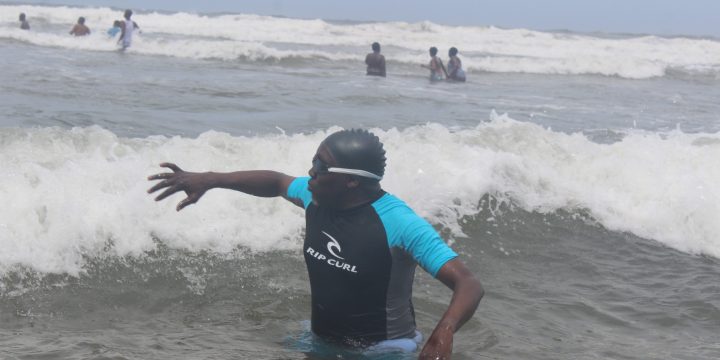
The latest transparency blunder, which involves dangerously high E. coli levels, is not the first time the eThekwini Municipality has sought to conceal poor results.
Durban mayor Mxolisi Kaunda pledged to be transparent about the quality of sea water at city beaches over the holiday season, by publishing the results of all water quality tests conducted simultaneously by the City and an independent laboratory.
And the City lived up to that promise – until last week (24 November), when an inconvenient set of very poor results from both the municipality and Talbot Laboratories was deliberately withheld by the City’s communication team – apparently on the basis that they were “outdated” and “we would not want to cause alarm for no reason”.
At a media briefing on the Durban beachfront earlier this month, Kaunda further sought to reassure residents and holidaymakers that the vast majority of the city’s 23 designated bathing beaches were safe and open for bathing.
Under pressure from the local hospitality industry and other groups to address the unresolved issue of poor or patchy beach water quality in the coastal holiday city, Kaunda and senior eThekwini Municipality officials also held “frank and robust” discussions with the Durban Chamber of Commerce and Industry on 9 November.

They resolved to pursue several measures to keep the city’s beaches clean and safe, to “consolidate our marketing campaigns to reposition Durban as a destination of choice for visitors” and to also work to regain international Blue Flag beach status for some of the most popular beaches.
Writing in his mayoral blog on the City’s website on 6 October (see above screenshot), Kaunda stated:
“The fact that most of our bathing beaches are now open for swimming is testimony to this hard work by our technical teams. We want to assure residents and visitors that the City only opens the beaches that meet the quality standard for safety of bathing water.
“To this end, from 5 October, we have collaborated with independent laboratories such as Talbot and the Durban University of Technology to conduct water tests on the same spot, date and time and subsequently release them simultaneously (emphasis added).”
Yet last week, when Daily Maverick requested a copy of the latest joint test results from the City’s communications unit, we received this curious response three days later:
“We are still awaiting the latest results from the joint sampling. We will share them once we have them. The ones we have are outdated, and we would not want to cause alarm for no reason.”
Smelling a rat, we searched the internet and found the latest dual test results were published by Talbot on 23 November (two days after we asked eThekwini for the latest results).
Yet, despite the mayor’s pledge to publish them simultaneously, eThekwini failed to provide them on request, or to post them on the municipality’s website or social media accounts.
This is what the results show:
Every one of the six Durban central beaches (tested simultaneously by laboratory technicians at eThekwini and Talbot on 16 November) had E. coli levels way in excess of safe bathing limits for recreational contact.
According to Talbot’s rating scheme, an E. coli (sewage bacteria) rating between 0 and 250 units is considered “ideal”. Readings between 250 and 500 are “acceptable”, while readings above 500 are “critical” and therefore unsafe for bathing.
According to eThekwini’s own test results, the lowest E. coli reading was 1,968 units (North Beach) and the highest was 15,290 (Country Club beach).
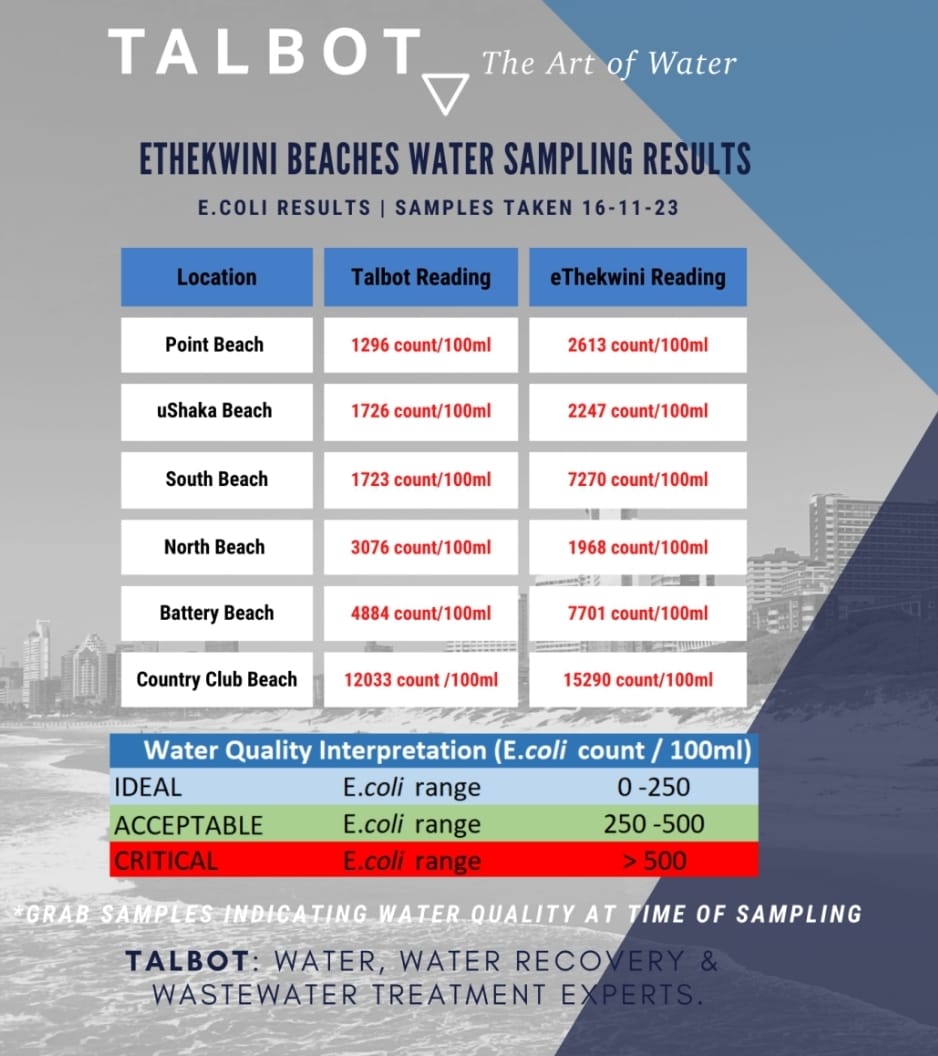
The inconvenient 16 November joint test results.
These one-off results from six central beaches on a single day may not paint a fair picture of the city’s overall sea water quality, since test results can fluctuate widely from day to day – especially when heavy rains wash pollution from rivers and stormwater into the sea.
It is also worth noting that the same six beaches were rated “excellent” in similar tests by Talbot and eThekwini just seven days earlier.
And it should be recorded that several other beaches tested by the City laboratory just before the “alarming” results of 16 November generally had good-quality water. For example, three Umhlanga beaches tested on 13 November had E. coli levels ranging from a low of 20 units at Lighthouse Beach to a high of 309 units at Bronze beach (all within the limits).
On the central Durban beachfront, Suncoast and South beaches also had very low readings.
But if the City has committed itself to a policy of transparency to reassure the public that there is nothing to hide, why did City officials try to conceal the embarrassing results?
That question was also posed by the independent environmental monitoring group Adopt-a-River in a Facebook post on 24 November.
“Adopt-a-River” said it had sampled a number of sites with Talbot for nearly two years and was then requested by eThekwini to conduct joint sampling at six beach sites for comparative purposes ahead of the 2023 festive season.
Of the six beaches they sampled jointly, four had generally maintained a good record, until the 16 November tests.
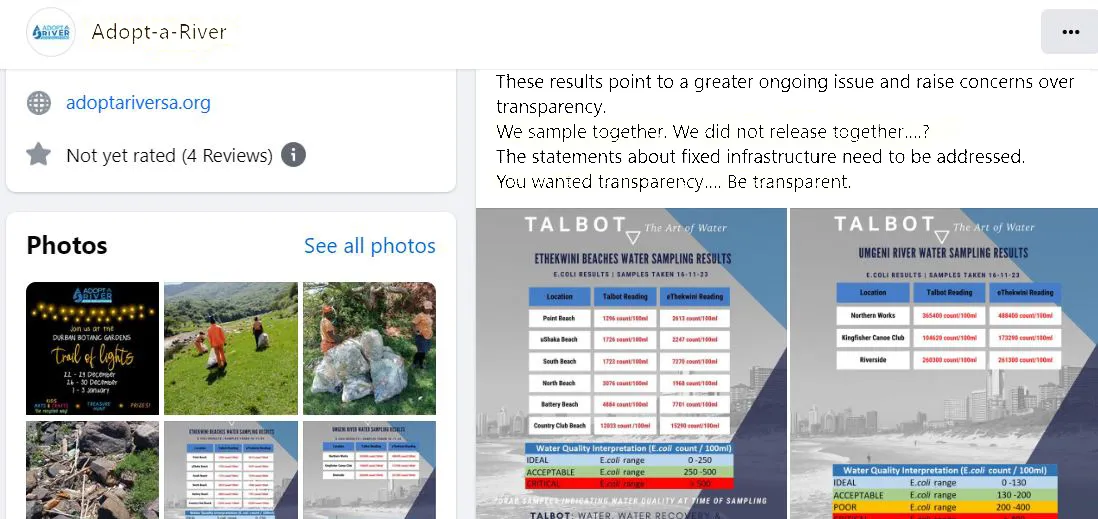
Adopt-a-River Facebook post on 24 November 2023
“This set of samples was collected after rain. This always brings nasty things down… We have always advised the public to keep out of the sea for a day or two after rain. Especially if there are rivers close by. These results point to a greater ongoing issue and raise concerns over transparency.
“We sample together. We did not release together… You wanted transparency… Be transparent.”
The latest transparency blunder is not the first time eThekwini has sought to conceal poor results. In January 2022 (several months before the devastating April 2022 floods damaged the city’s wastewater treatment works and pump stations) City official Malcolm Canham went on television to reassure the public that Durban’s beaches were safe for swimming, when official test results showed unacceptable water quality.
So, Daily Maverick contacted senior City communications manager Gugu Sisilana to ask why her unit was withholding the latest dual test results?
The allegations that the City is hiding results are unwarranted and only seek to tarnish the image of the City ahead of the festive season for motives unknown to the City.
In a series of email exchanges, she denied that any results were being “hidden”.
“The results of the joint sampling were last taken on 16 November 2023. Since then, more water quality sampling tests have been conducted as these results are ever changing depending on various environmental factors.
“When your request came on Wednesday, 21 November 2023, we were informed by scientists that the results you were requesting were already outdated and were given the latest results published on our website dated 22 November 2023, which have been shared with you for ease of reference.”
(NOTE: These are the City’s own results for all 23 beaches – not the latest dual test results from Talbot and eThekwini. Also note that eThekwini is quite happy to include good test results from 16 November in this table, but not the poor results from the same day)
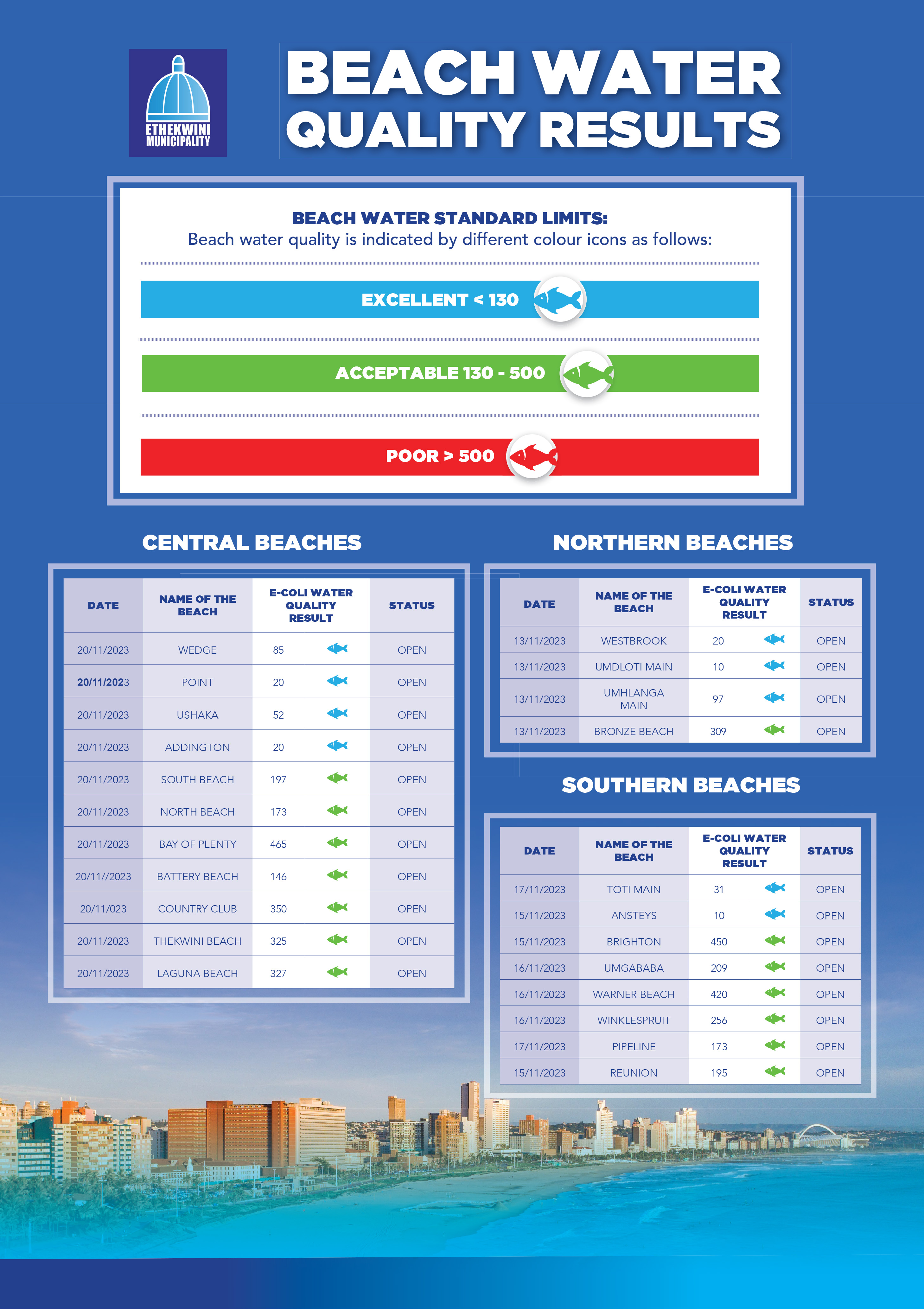
eThekwini’s latest beach and pool status report. Note that it includes good results taken on 16 November, but excludes poor results taken from other beaches on the same day.
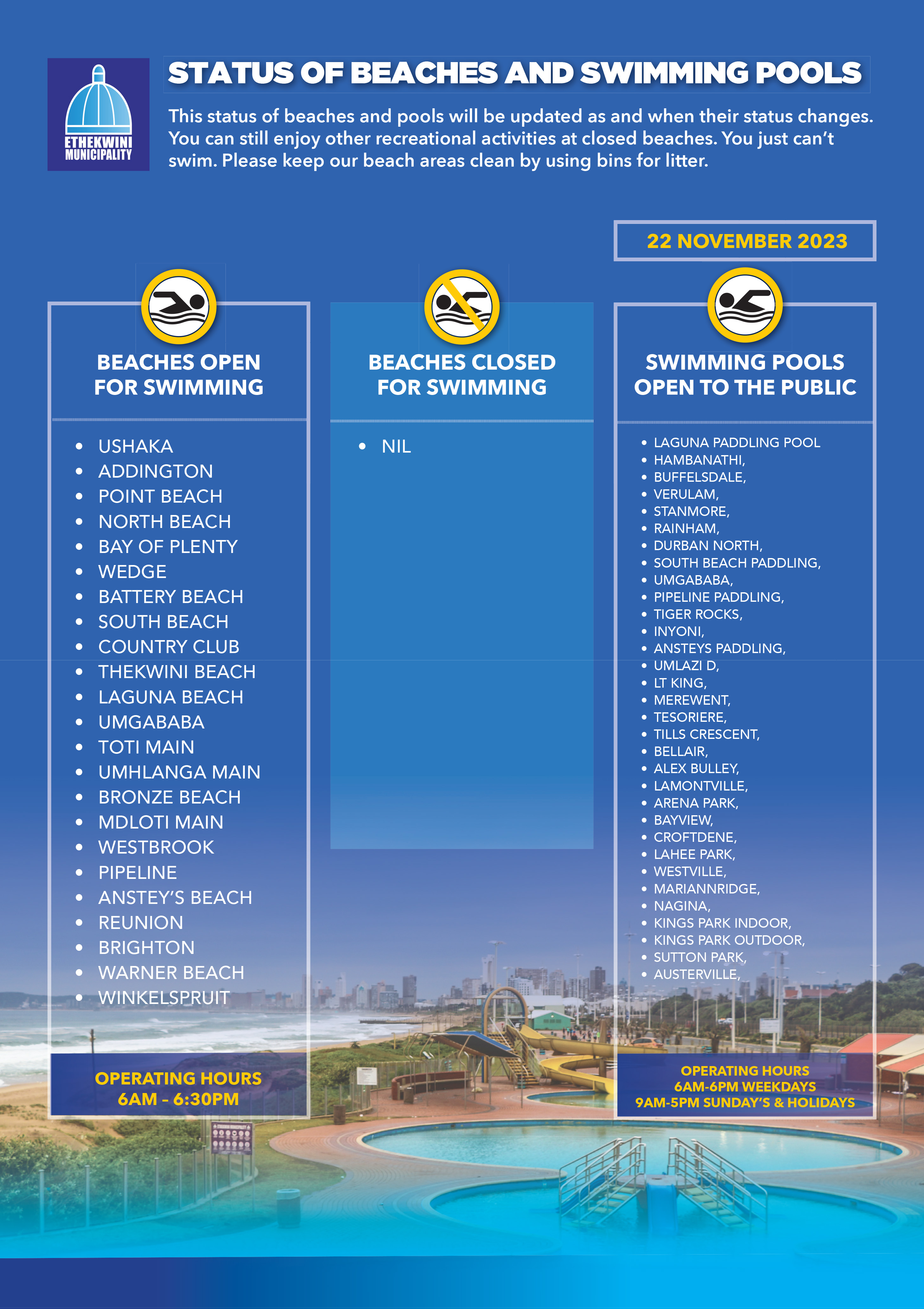
eThekwini’s latest beach and pool status report.
“We were then advised by the scientists that the next joint sampling is on Thursday, 23 November 2023. This morning we requested for those results but were informed by scientists that those results are still being processed and are not yet available.
“If the City’s intention was to hide water quality results, it would not have entered into a joint sampling agreement with independent scientists. It must be stressed that in all the beach water quality samples taken jointly by the municipality with independent scientists our results have always been comparable. This confirms the reliability and accuracy of the water quality test results the municipality has always been taking and publishing.

Mayor Mxolisi Kaunda (centre) makes a point at a recent media briefing on beach safety. He is with Durban city councillor Ernest Smith (left) and Durban Chamber of Commerce and Industry president Prasheen Maharaj. (Photo: eThekwini Municipality)
“Why do you not want to wait for the current results if your intention is not to cause unnecessary harm or panic?” she asked.
“All bathing beaches in the City are open and safe for bathing as per the latest test results. The allegations that the City is hiding results are unwarranted and only seek to tarnish the image of the City ahead of the festive season for motives unknown to the City. The latest beach water quality results are available on the municipal website www.durban.gov.za.”
But why, we repeated, were the inconvenient 16 November results not published by eThekwini, as mayor Kaunda pledged?
“The municipality would be doing the public a disservice if it were to publish the results of six or nine bathing beaches out of a total of 23,” Sisilana responded. “My understanding from discussions with scientists is that the published beach results are based on samples and tests conducted on all 23 bathing beaches and not just a select few… We do not have last weeks’ results because they are outdated and no longer relevant. Therefore, I will not lie to you because you want me to lie and confirm outdated reports.” DM





















 Become an Insider
Become an Insider
Just put today’s E. coli level on the board at the beach entrance that gives the current water temperature. I don’t really care if the water was too dirty (or too cold) to swim last week.
Thanks Tony, by the way, all test results are out of date because the testing procedure takes 24-48hrs to complete. That’s why we developed the wozolwandle model and app to provide users with real time and forecast WQ predictions.
Never mind decolonised education, go to Durban where you’ll get an E. colinised education. And it’s not only in the water there, either.
Ha ha
This amounts to fraud by this anc run shambles of a city. They are deliberately endangering their citizens by withholding information they are legally required to present to the public. Heads should roll (of corse they won’t).
So when it rains sewage flows from the rivers into the sea. This means that raw sewage is still flowing into the rivers! The sewage plants have clearly STILL not been fixed after over two years! Typical ANC corruption, lies and stealing! Now they’ll blame vandalism – yeah, we believe that people want to be in sh*t to break sh*tty stuff covered in sh*t while being drenched in flowing sh*t.
Ah yes, the ANC. For them this is normal work-in-progress in Durban, ie sit around and do nothing while the infrastructure crumbles around them due to lack of maintenance. Actually they do work very well in one aspect. They never fail in collecting fat pay cheques every month for doing nothing.
Years ago – more than I care to remember – the columnist for the Natal Mercury, The Idler, had this to say when eColi levels were an issue (it isn’t a new problem):
People don’t swim at Durban beaches any more – they just go through the motions!
LOL
I would submit that the reason for the lack of transparency is because the municipality knew the test results would be blown out of proportion – which is EXACTLY what has happened on social media. Despite good test results for weeks before this. People just couldn’t wait to jump on this, share it with no context or history of previous tests, and speculate that our beaches will be closed in December. Which only serves to make potential visitors avoid coming to Durban for their holidays.
I’m not defending Ethekwini – our river water is terrifyingly polluted thanks to their failure to maintain the waste water treatment works and monitor industrial effluent. The fact that our town beaches are open has nothing to do with “hard work by our technical teams” and everything to do sheer dumb luck that the prevailing currents carry the Umgeni outflow northwards, away from the central beaches.
But my point is this: sharing one-sided, unbalanced, alarmist reports has the result of chasing tourists away from Durban – as happened last year, when in fact the water quality was acceptable over the holiday period (at the central beaches, at least). This had a devastating impact on businesses and individuals who rely on tourism over December to make ends meet. Journalists and residents need to consider the impact of their posts – think of the jobs and livelihoods impacted by scaring tourists away, on the basis of one week’s test results (which cleaned up within a few days).
Speaking for myself, I’d rather err on the side of caution and not take a chance by going somewhere where I *know* that the water is clean and potable.
If that makes me “one-sided, unbalanced, [and] alarmist,” then that’s just too bad.
Totally agree. No one shoots us more in the foot than the DM when it appeases its legion of naysayers.
Speak for yourself.
You are welcome to swim in water that is contaminated with faeces. I, for one, refuse to.
The point made by Michele that I was commenting on does not hide that there is a problem but rather highlights how the issue is blown out of proportion by fear mongering, which creates unnecessary negativity, economic impact etc. I’ve been a regular surfer for the past 40 years on the Durban beachfront and polluted water after heavy rains has ALWAYS been a problem (as is the case in surf breaks around major cities globally), with the odd ear infection or gastric illness here and there but it has never stopped us surfing. The good thing now is that the authorities are trying to solve it.
The point is not the results nor the sh1t in the water. The point is that the results, whatever they are, are supposed to be published. They weren’t – so the council is lying.
If results were published timeously – good or bad – on a daily basis there would not be such controversy and media drama. It is the fact that the results were left out, then all was silent about the 16 November, until difficult questions were asked. It just makes the bad results glaringly obvious. We all know that the sea is a wonderful self-cleaning natural wonder – well, it used to be before man’s pollution became too much for our oceans – and heavy rains force all the filth, waste & pollution to flow into the sea. Nothing has been done over the years about ensuring our river systems further upstream are pristine & communities are educated about pollution & waste and the best way of keeping their environments clean. The e-coli levels could be reduced permanently if water treatment plants were properly maintained. And, of course, education is the key and the will and hard work to keep our natural resources & our tourism working together.
But the talk, talk, talk goes on endlessly and only a few pro-active people get things done in whatever way they can. Durban (in fact KZN) is so dependent on tourism, yet the basics of clean sea water / clean river water are the most neglected aspect because, sadly, it costs way too much money now to make a dysfunctional municipality do its job properly, as it should have been doing for the last 30 years. Maintenance is not a recognised function in most of our municipalities all around South Africa. What a pity.
It’s a lot more than “a pity” Janet. It’s an absolute bl**dy disgrace! Donald Trump was not wrong when he referred to some countries being absolute “sh*tholes”. Well done South Africa – you have now reached that target!
If the issue exists for more than one day a year, that likely indicates system failure and water quality should be considered not fit to swim in. Moreso when the sewer systems are under bigger pressure, like holiday seasons.
We have the same issue in Knysna. The problem has been going in for nearly two decades and its not one person’s fault. It’s complete system failure from the combination of poor maintenance, load shedding and municipal permits to flush into the estuary that don’t factor in these realities. Now add municipal bankruptcy to the mix and we get further away from the fix.
The result is that you don’t put your big toe in the water except where the sea is flushing daily. And we have had the same hush hush directives through the years to protect tourism. It all seems hopeless in this current regime.
Please have a look at the Ecoli test results that came out this week. The Ecoli readings are extremely low. Our readings will be high when there is lots of rain, but most of the time low. North Beach reading 20 by Talbot and 10 by Ethewini so the water is totally safe.
“Alytyd ‘n drol in die seewater!”